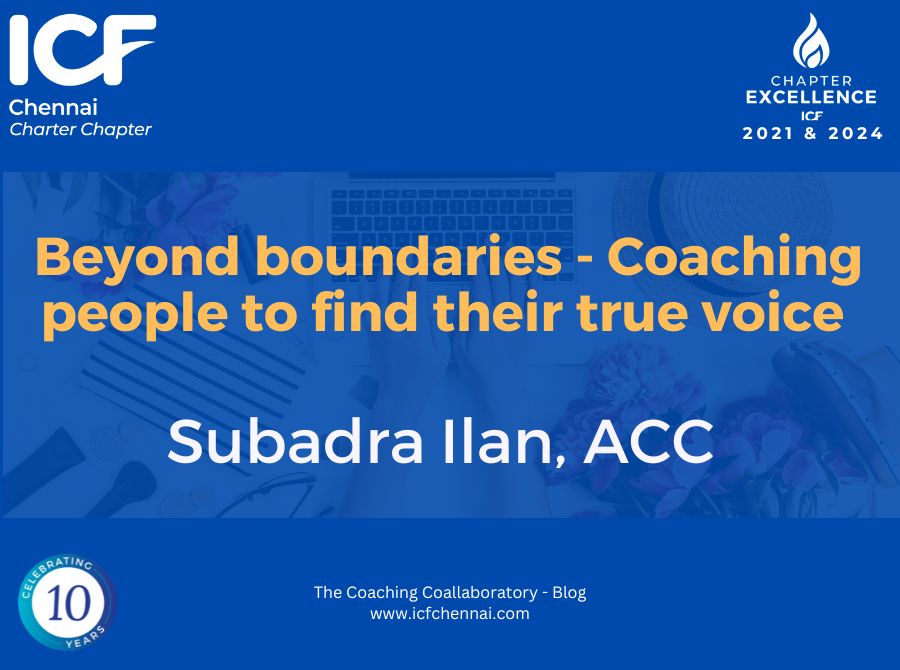Beyond boundaries – Coaching people to find their true voice

The biggest barrier in communication is not language – it is the silence we keep out of fear of being judged.
Coaching, according to common understanding, is unlocking a client‘s potential by asking exploratory questions. And asking such questions means language and communication need to be effective, doesn’t it?
Initially, as I began my Coaching journey, I too shared the same opinion. It was only as my coaching hours started growing that I realised that Coaching is more than just communication between two people.
When many people hear that I am a career success and a communication coach, they think and assume that my work is all about grammar, vocabulary, speaking and presentation skills. And yes, these things matter.
But over time, what I have learnt is, people are not really looking for perfect language. They are looking for the true voice.
Sometime back, I was coaching a midlife corporate professional who was into Career transitioning. He had identified various job openings and had attended a number of interviews, but was not successful.
He heard about me as a Career Success and Communication coach and approached me. He was a smart and technically brilliant individual.
But during our conversations, he mentioned that in most of the interviews, he used to remain silent most of the time and speak up only when he was constantly prodded for an answer.
When I asked him gently why this was so, he replied that, although he knew his answer would be right, he feared that his language might not be good enough.
In that moment, what struck me was not his language but it was his fear of being judged.
Underneath, his struggle was not at all about language and communication; rather, it was about confidence, mindset and the courage to speak up.
This is where coaching made a difference. We did not work on grammar and rules, rather we worked on building confidence, picking up the courage to speak, a mindset shift and celebrating his reframed clarity on ideas that he developed during the process.
He gradually learned that people valued what he had to say and not how perfectly he could say it.
And that’s when his true voice started emerging.
Coaching is not about polishing words – it’s about uncovering the truth.
In every coaching session thereafter, I started noticing a similar pattern. Be it a young graduate just getting into a job, women coming into work after a career break or mid-life professionals in career transition, all of it was rarely about ‘fluency’ in communication.
Rather, it was about
- Courage – to say what matters to him/her
- Clarity – structuring their thoughts so that ideas flowed seamlessly and others could understand
- Confidence – believing in oneself and trusting the words one is speaking
Language is only a medium. The real transformation of the person takes place when one starts to believe their own voice.
Why this matters
In today’s world, opportunities don’t come to the loudest voice — they come to the authentic voice.
People who can stand tall and are able to speak with conviction, who can ask questions without fear, who can say “I don’t know” when needed, are the ones who move ahead both professionally as well as personally.
As a coach, we don’t just work with language or skills. We hold space where people are able to discover what they already have.
Our role is to help them remove the doubts that subdue their voice.
Here’s a reflection for all of us
Think – how many times have you stopped yourself from speaking up, just because you weren’t sure how it would “sound” to the other people?
This is the gap that coaching fills. Not by giving you better words, but by giving you the freedom to use your own words.
Closing thought:
As I work with midlife professionals, I have realised something very simple yet profound.
Career success doesn’t begin with perfect language. It begins with the courage to speak your truth.
And coaching is the bridge that helps people cross that silence.
Subadra Ilan
The views and opinions expressed in guest posts featured on this blog are those of the author and do not necessarily reflect the opinions and views of the International Coach Federation (ICF). The publication of a guest post on the ICF Blog does not equate to an ICF endorsement or guarantee of the products or services provided by the author.
Additionally, for the purpose of full disclosure and as a disclaimer of liability, this content was possibly generated using the assistance of an AI program. Its contents, either in whole or in part, have been reviewed and revised by a human. Nevertheless, the reader/user is responsible for verifying the information presented and should not rely upon this article or post as providing any specific professional advice or counsel. Its contents are provided “as is,” and ICF makes no representations or warranties as to its accuracy or completeness and to the fullest extent permitted by applicable law specifically disclaims any and all liability for any damages or injuries resulting from use of or reliance thereupon.

